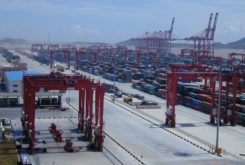Portugal and some other highly indebted Southern European states have welcomed Chinese investment with open arms. Still struggling to escape the legacy of the 2008-09 economic crisis, they are desperate for infrastructural investment. Yet the European Union’s (EU) bigger powers have become increasingly concerned about Chinese influence in telecoms, logistics and other strategic industries and look set to introduce rules that could see China’s biggest companies look elsewhere for investment options.
As CLBrief reported in December, the Portuguese government welcomed Chinese premier Ji Xinping with open arms, signing a Belt and Road agreement with Beijing {https://clbrief.com/sines-portugals-link-to-one-belt-one-road/} and discussing port sector investment in the process. However, Lisbon could come under pressure from other European capitals to reassess its relationship with Beijing.
The EU attracted a quarter of all Chinese foreign direct investment (FDI) in 2017, with transport, utilities and infrastructure attracting most investment, a change from 2016 when ICT took top spot. Of EU states, the UK has attracted the most Chinese investment since 2000, which is perhaps no surprise given the open nature of its economy and the fact that it has actively sought to court Chinese companies. It is followed by Germany, France and Italy, then Portugal, the Netherlands and Finland.
While the US has long harboured suspicions about the motivation behind Chinese investment, the EU had not been particularly worried about the issue until fairly recently. One of the first signs of a big change in European policy came in August when Berlin blocked the takeover of a German company on national security grounds for the first time.
Chinese nuclear firm Yantai Taihai had sought to buy Leifeld Metal Spinning, which produces components for the nuclear and aerospace industries. Germany had drafted its own national security legislation after the biggest domestic robotics manufacturer, Kuka, was taken over by China’s Midea for US$5 billion.
In December, EU member governments announced plans to allow the European Commission to scrutinise investment by foreign state owned companies in critical sectors, such as energy, transport, ICT, media, health, food supply, robotics and nano-technology. The legislation does not specifically name the Chinese government but there is no doubt that the plan is designed to counter Chinese influence.
Some member states already individually assess the pros and cons of foreign takeovers or investment on security grounds and they will be allowed to retain these standards. The purpose of the new EU-wide regulations is to provide a minimum level of oversight. If a third of member countries signal their worry over a specific deal, the Commission will be obliged to investigate it, although Brussels could not actually block it. In addition, a mechanism will be set up to allow member states to share information and concerns.
The proposed legislation was rubber stamped by the European Parliament in November, in what European Trade Commissioner Cecilia Malmström described as an “important milestone”. She said: “In an increasingly interconnected, interdependent world, we need means to protect our collective security while keeping Europe open for business.” The move is opposed by Portugal, as well as Cyprus, Greece, Luxembourg and Malta, but it remains to be seen whether they are able to vote down the document when the vote on its passage is taken in February or March.
Why are they concerned?
The concerns are greatest with regards to Chinese state owned companies, as the operations of listed companies are subject to much closer scrutiny under stock exchange rules. In a statement, the EU argued that there had been a surge “in investments relating to critical EU assets which are not the result of normal market forces”.
The same concerns have been raised in the US, Canada, Australia and Japan, with the result that global FDI by Chinese companies has begun to fall. According to the United Nations Conference on Trade and Development, Chinese FDI fell from US$196.15 billion in 2016 to US$158.29 billion in 2017 and may have fallen further last year.
There is a certainly a strategic element to some Chinese investment that goes beyond commercial considerations. For instance, Chinese firms have now taken substantial stakes in a dozen EU ports, as in many Asians states, in support of Beijing’s Belt and Road strategy. For instance, Cosco first invested in the main port in Greece, Piraeus, in 2010, buying a controlling stake in the port concession in 2016 which lasts until 2052, as the Greek government sold off assets in order to bolster its struggling finances.
Athens subsequently blocked a joint EU statement on Chinese internal policy, prompting many European leaders to fear that the acquisition of Piraeus would allow Beijing to exert political sway over Athens. Some in Greece have also criticised the lack of job security at the port, although the Chinese firm has invested heavily in a port that other international port operators overlooked.
Most recently, in January 2018, Cosco signed a concession to operate the container terminal at the port of Zeebrugge in Belgium. However, Chinese influence has yet to take control of EU’s biggest ports, such as Rotterdam, Antwerp or Hamburg, although Cosco holds a minority stake in Rotterdam.
The EU argues that it will not cite security concerns as a tactic in forcing Beijing to agree new trade rules but this cannot be ruled out. There are currently huge restrictions on European companies hoping to invest in China, forcing them to operate with local partners and transfer technology to them. As a result, Brussels has joined Washington in pressurising Beijing to open up its own economy to foreign investment to create “a genuinely open and level playing field for international businesses engaged in trade and investment in China”.
The technology angle
While control by Chinese parastatals generates most discussion, it is also feared that private companies with close ties to Beijing can be used to enact Chinese state policy. The debate is typified by the UK’s attitude to Huawei. The Chinese telecoms giant became one of UK telecoms firm BT’s biggest suppliers as long ago at 2005 and although Westminster published plans for new national security legislation in July, huge uncertainty over Brexit might be expected to discourage the UK government from blocking any Chinese investment.
However, BT has now revealed that it is removing Huawei equipment from the core of its 3G and 4G networks and will not employ it at the heart of its planned 5G network. Despite not being a state owned company, it is feared that Huawei could use its technology to assist Chinese espionage or network failure. The Australian and New Zealand governments have already blocked Huawei from developing their own 5G networks.
Huawei chairman Liang Hua responded by warning that his company might pull out of Western markets if its investment plans are repeatedly blocked and “would transfer the technology partnership to countries where we are welcomed and where we can have collaboration with”.
There seems to be some substance to such fears but it is also possible that EU security fears have been compounded by Beijing’s ‘Made in China 2025’ plan to dominate international hi-tech manufacturing. The Chinese government should be lauded for its aim of reducing the country’s dependence on low-value, high-volume manufacturing but European leaders fear their own technology companies being swallowed or overtaken. The big question is whether this will be achieved by fair means or foul.
Contrast with US approach
If passed, the EU plans will not provide an outright block to Chinese takeovers or investment but it could set the tone. Political opposition at the highest levels does make a difference, as the dramatic fall in the level of Chinese investment in the US demonstrates. Chinese companies invested US$24 billion in North America in the first six months of 2017 but this figure fell to just US$2.5 billion for the same period in 2018
This was only partly because of more robust screening of investment perceived to threaten national security, as opposition from the Trump administration and the brewing Sino-US trade war also played a role. By contrast, Chinese firms invested US$20 billion in Europe in the first half of 2018, according to figures from law firm Baker Mackenzie, much of it apparently redirected from the US. The EU may be moving towards US-style examination of Chinese investment but there is no prospect of a European version of the Committee on Foreign Investment in the United States (CFIUS), which can block takeovers.
While national security plays a role in Washington’s strategy, it is also driven by a desire to correct the trade imbalance between the two countries. European leaders have sought to distinguish between issues of trade rules and national security; and Beijing and Brussels have agreed to set up joint working groups on World Trade Organisation reform. Yet there is no guarantee that it will not influence their approach at some level.
In mid-January, the Chinese foreign ministry called on the EU to reduce barriers to Chinese investment rather than erect them, and to participate in the Belt and Road initiative. Seeking to distance Brussels from Washington, the ministry stated: “China and the EU need to stand firmly against unilateralism and protectionism, push for a more open, inclusive and balanced economic globalisation beneficial to all.” It also called on European governments to remove obstacles to the export of cutting-edge European technology to China.
The statement added: “China hopes that the EU will keep its investment market open, reduce and eliminate investment hurdles and discriminatory barriers, and provide Chinese companies investing in Europe a fair, transparent and predictable policy environment and protect their legitimate rights and interests.” Some in China argue that European leaders are merely frightened over the strength of Chinese firms.



